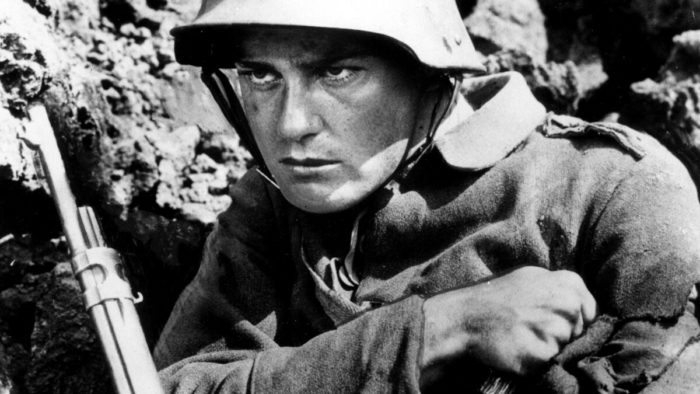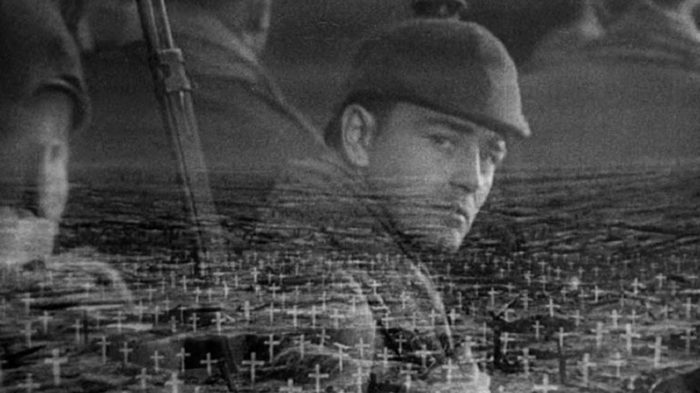
3rd Academy Awards (1930)
Nominations: 4
Wins: 2
Like last year, I’m taking advantage of a remake of a best picture winner being nominated for best picture as an opportunity to see both films for the first time. Unlike last year, instead of doing that in one post, I’m planning on doing it in two! That is, unless I find I’ve used up most of what I’ve got to say about this subject here, in which case, don’t worry, I’ve got a backup plan. So then, let us head back in time, nearly a century ago, to the third ever Academy Awards. There, an anti-war film called All Quiet on the Western Front made history as the first ever to win both Best Picture and Best Director, which, by the way, also made its director, Lewis Milestone, the first person to win two Oscars (he also won Best Director – Comedy at the First Academy Awards for Two Arabian Knights). This triumph capped off a whirlwind of success for this story, which began as a novel published in English only a year prior. But does it hold up?

All Quiet on the Western Front is so old, it predates the Hays Code, the oppressive industry censorship guidelines that forced Hollywood into the realm of innuendo for three decades until the MPAA film rating system was invented. Thankfully it’s also recent enough that it was filmed as a “talkie,” having been originally released a little less than three years after The Jazz Singer. What that all adds up to is a war epic that doesn’t feel that dissimilar from the many war epics that are still made today… probably because so many of them are still so infatuated with the two World Wars. But this is a movie full of big scenes crammed with extras, explosions, and crumbling exteriors. It’s loud and violent (like blood and gore) and not afraid at all about showing a tragic, complicated story. And it does all these things in service of one simple message: war ruins the lives of everyone it touches.
Of course, you won’t hear that from Professor Kantorek (Arnold Lucy), a teacher and proud nationalist in some German village at the start of The Great War, who sets this story in motion by passionately urging his graduating class to fight for the Fatherland. The young men enthusiastically decide to enlist and are quickly off to boot camp, where they face their first hardship under the bitter tutelage of their new instructor, Corporal Himmelstoss (John Wray). Beaten but unbroken, the boys are sent off into combat as part of the army’s 2nd Company. They’re barely off the train when the company suffers its first casualty, a young man who had only joined due to peer pressure is caught in a shelling attack and instantly dies. The rest join up with the grizzled veterans of their company, who teach them that things are already so bad that they don’t even have food. The boys are taken under the wing of Stanislaus “Kat” Katczinsky (Louis Wolheim), who helps them brave the horrors of their first trip to the trenches. Many don’t return.

It’s at this point, after many deaths, it finally started becoming clear to me who the main characters were. When they escape the trenches, 2nd Company, which has halved in number, gets a brief reprieve to relax and enjoy extra provisions. A small group gathers to talk about what they’re even fighting for, and the consensus is that no one knows. Chiefly among them is Paul (Lew Ayres), the most introspective of the soldiers and someone capable of admitting that the patriotism that led to him enlisting is now gone. Instead, he fights for his friends in the company. Which makes things all the more brutal as time goes on and more and more of them are killed or maimed. In one harrowing scene, we watch as one soldier’s luxurious pair of boots gets passed between several owners who each die before they finally make their way to Paul.
The average soldier in WWI was so young, even Leonardo DiCaprio wouldn’t try to date them. Many of them were literally half the age I am now. Going through what Paul goes through in just this first part of the movie is more than any person should have to bear. But what makes All Quiet on the Western Front more interesting than other war movies like, for instance, 1917, is that it tries to captures the wholeness of Paul’s experience in the war: not just the infliction of trauma, but the consequences of it too. He becomes cynical about patriotism. He learns how to deal with the sudden, unexpected, violent deaths of friends, and uses that to find more value in being alive. In a surprising sequence, he is granted furlough and returns to his village where he discovers that he no longer can relate to the people there anymore. By the end of the movie, the only place left for him is the front, and we all know what’s waiting for him there.
So yeah, All Quiet on the Western Front holds up. And, you know, there’s a land war in Europe going on again. Maybe a good idea to refresh yourself on why this is so stupid. Also people in this country keep banning books, which is the most un-American bullshit but I can’t get into that here. All Quiet on the Western Front, the novel, was considered such an effective piece of pacifist media it was among the first books to be banned and burned by the Nazis. Goebbels literally had the Berlin premiere of this film adaptation sabotaged by sending henchman to release mice and set off smoke bombs before it was finally formally banned. The movie was also censored or banned in Italy, Austria, France, and Victoria, Australia. The reason? Again, because it was too effective as “anti-war propaganda.” There are no good wars. Fuck the fascists! Read banned books!
